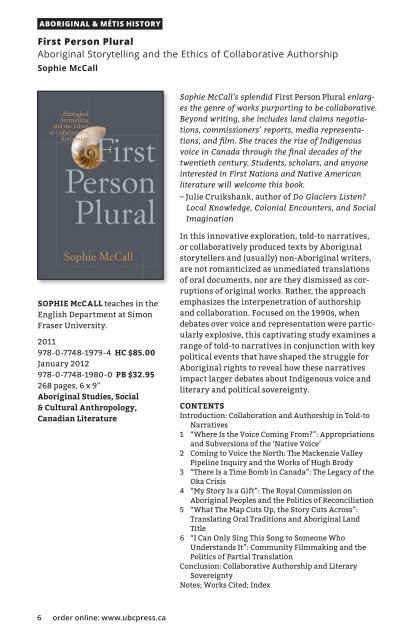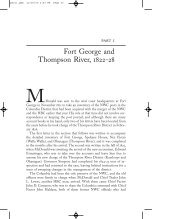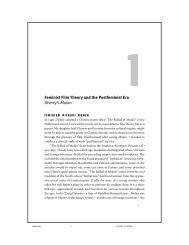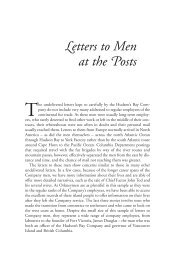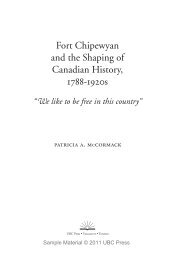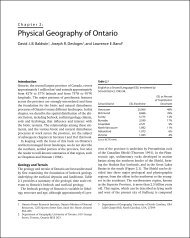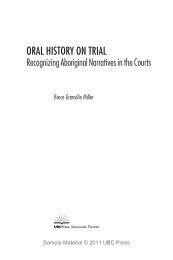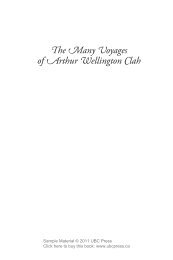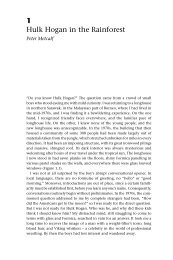2012 Aboriginal Studies - UBC Press
2012 Aboriginal Studies - UBC Press
2012 Aboriginal Studies - UBC Press
Create successful ePaper yourself
Turn your PDF publications into a flip-book with our unique Google optimized e-Paper software.
ABORIGINAL & MÉTIS HISTORY<br />
First Person Plural<br />
<strong>Aboriginal</strong> Storytelling and the Ethics of Collaborative Authorship<br />
Sophie McCall<br />
SOPHIE McCALL teaches in the<br />
English Department at Simon<br />
Fraser University.<br />
2011<br />
978-0-7748-1979-4 HC $85.00<br />
January <strong>2012</strong><br />
978-0-7748-1980-0 PB $32.95<br />
268 pages, 6 x 9 "<br />
<strong>Aboriginal</strong> <strong>Studies</strong> , Social<br />
& Cultural Anthropology ,<br />
Canadian Literature<br />
6 order online: www.ubcpress.ca<br />
Sophie McCall’s splendid First Person Plural enlarges<br />
the genre of works purporting to be collaborative.<br />
Beyond writing, she includes land claims negotiations,<br />
commissioners’ reports, media representations,<br />
and fi lm. She traces the rise of Indigenous<br />
voice in Canada through the fi nal decades of the<br />
twentieth century. Students, scholars, and anyone<br />
interested in First Nations and Native American<br />
literature will welcome this book.<br />
– Julie Cruikshank, author of Do Glaciers Listen?<br />
Local Knowledge, Colonial Encounters, and Social<br />
Imagination<br />
In this innovative exploration, told-to narratives,<br />
or collaboratively produced texts by <strong>Aboriginal</strong><br />
storytellers and (usually) non-<strong>Aboriginal</strong> writers,<br />
are not romanticized as unmediated translations<br />
of oral documents, nor are they dismissed as corruptions<br />
of original works. Rather, the approach<br />
emphasizes the interpenetration of authorship<br />
and collaboration. Focused on the 1990s, when<br />
debates over voice and representation were particularly<br />
explosive, this captivating study examines a<br />
range of told-to narratives in conjunction with key<br />
political events that have shaped the struggle for<br />
<strong>Aboriginal</strong> rights to reveal how these narratives<br />
impact larger debates about Indigenous voice and<br />
literary and political sovereignty.<br />
CONTENTS<br />
Introduction: Collaboration and Authorship in Told-to<br />
Narratives<br />
1 “Where Is the Voice Coming From?”: Appropriations<br />
and Subversions of the ‘Native Voice’<br />
2 Coming to Voice the North: The Mackenzie Valley<br />
Pipeline Inquiry and the Works of Hugh Brody<br />
3 “There Is a Time Bomb in Canada”: The Legacy of the<br />
Oka Crisis<br />
4 “My Story Is a Gift”: The Royal Commission on<br />
<strong>Aboriginal</strong> Peoples and the Politics of Reconciliation<br />
5 “What The Map Cuts Up, the Story Cuts Across”:<br />
Translating Oral Traditions and <strong>Aboriginal</strong> Land<br />
Title<br />
6 “I Can Only Sing This Song to Someone Who<br />
Understands It”: Community Filmmaking and the<br />
Politics of Partial Translation<br />
Conclusion: Collaborative Authorship and Literary<br />
Sovereignty<br />
Notes; Works Cited; Index


